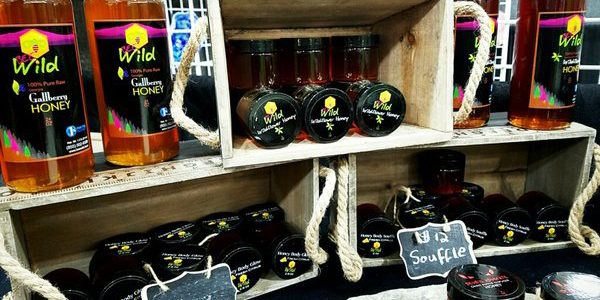Know Where Your Food Comes From:
Why Farmers Markets Are Better
Over the years we’ve talked to our readers about buying local, seasonal, organic “real food,” because it’s integral to sustaining and expanding good health. But, what do we mean when we say, “local,” “seasonal,” “organic,” “real?” Where can we find the best food? Can we go to the local chain or local specialty chain grocery store, buy real food, and save money at the same time? Today, I’m going to write about “local” food and tell you what I found that means. Then, I’ll let you know why I think farmers markets are better able to meet your “real food” needs.
Eat Local Food for Health
Recently, one of our team members went to the Community Farmers Markets planning meeting. He found out some interesting information that we want to share with you. CFM representatives said that attendance at local farmers markets had reduced since chain/specialty grocery stores started advertising having healthy food. These stores claim to give you the same high quality local food at a cheaper price, because they buy in bulk from local farmers. But, do they really? We were surprised at the answer to that question, an unequivocal “NO” in many cases.
Apparently, the food at local grocery/specialty food stores is local to someone, but not necessarily local to you. So, for example, a store can advertise locally grown avocados when they were grown by local farmers in Mexico, picked when they weren’t ripe, and shipped to your local grocery store for sale to you days, if not more than a week, later. In fact, several specialty food chains have had multiple complaints about the mislabeling of food as “local.” What we found out is that the only way you can be sure your food is grown locally to you is to talk to the local farmer/food producer who is selling the food at your local farmers markets or food coops.
Why Is Eating Local Food So Important
Let’s take my favorite example – the community farm plots my grandparents and parents automatically tended with other neighbors as I grew up. The soil still was mineralized sufficiently and filled with good bacteria that were local to the area. When we picked fruits and veggies, rinsed them off under the hose, and ate them immediately, you were getting active nutrients and good local bacteria in your gut. That way, when local strains of the flu and/or colds came around. your body was filled with good bacteria that would help fight them off. This helped everyone in the community have a stronger immune system.
Too, because of weather considerations (We lived in Chicago.), our growing season was relatively short. There were things we couldn’t grow (like citrus fruit) or that we grew in different ways (like we started tomatoes in growing frames to extend the growing season). So, our menu plans at home mostly included what we could grow or what farmers a bit further afield from us, who we knew personally, could grow (corn, for example, because it takes quite a bit of room to grow). (In fact, I believe I was around 5 years old before we had a Piggly Wiggly in our town. Piggy Wiggly didn’t even carry real food when it first opened; it only carried staples and cleaning supplies. Before that, we had local bakers, butchers, fruit stands, etc. where local food products were sold.)
So, our bodies acclimated to local real food and the good bacteria the food carried. In fact, I remember our parents driving us to Arizona to visit my Aunt. We stopped at various diners along the way, and as I recall, we had quite a few tummy challenges eating foods that we had never tried before. We spent days acclimating to the change in nutrition.
For those who would like a more scientific approach to this subject, here is a great article from Michigan State University. I used the search string, “benefits of eating local food,” if you want to continue your research.
Eat Local Honey to Strengthen Immunity
Our fearless leader, John Wright, has said many times that his family has always eaten a spoonful of local honey daily to strengthen immunity and ward off allergies. When you eat local honey, you are eating pollen that the bees have already processed. It’s like having an allergy shot. It acclimates your body to dealing with local pollen. Honey gathered in other areas of the country won’t do as well.
Where Can We Find Local Food?
Of course, the best thing you can do is grow some of your own food. The three of us work every year on growing some of our food on our deck. Here is one post where I talked about this and shared photos.
If growing some of your own food is beyond your means, then you can purchase the best local, seasonal, organic food at local farmers markets like those supported by the Community Farmers Markets group. When you can talk to the farmer, the person who canned the fruit, the food producer who milked the cow, you can educate yourself on what you are eating. You will know what soil amendments, fertilizers, and pesticides (if any) the farmer uses. You will understand how he/she treats their animals. When you have these conversations, you will understand why paying that little bit extra to support the local farmer (and, therefore, the local economy) only make sense.
Bee Wild appears at many local farmers markets. Be sure to follow us on Facebook, Twitter, and Instagram to find out where we are.
Stay Tuned for A Discussion about Seasonal Food
My next discussion will be about seasonal food and how to extend your local food season. In the meantime, if you haven’t voted in our Infused Honey Poll, vote here.







